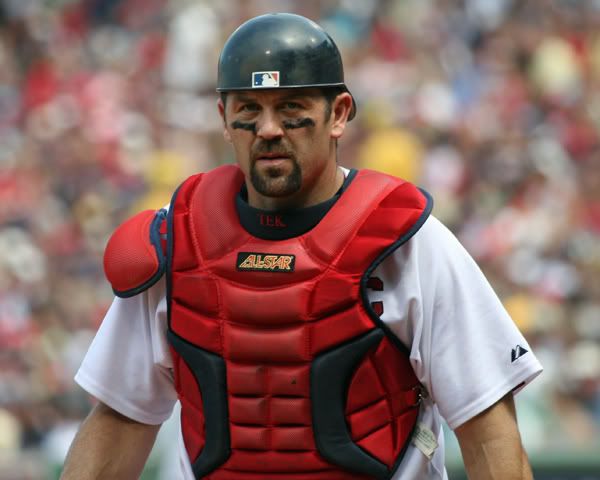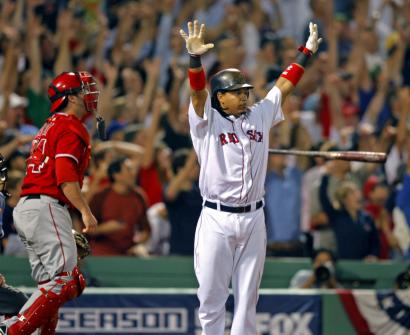
Yesterday, Curt Schilling announced he will undergo season-ending shoulder surgery. This likely means that Schilling's career is also finished. The fact that Schilling will likely never throw another pitch is something that even Schilling admitted, saying "My season is over, and there’s a pretty decent chance I’ve thrown my last pitch forever." Schilling has enjoyed a fantastic career, yet he is still not considered to be a sure-fire Hall of Famer. However, everywhere he has gone, Schilling has left an impact. Schilling will finish with three World Series rings, 216 victories, 146 losses, and a career ERA of 3.46. He could possibly be the best big-game pitcher in baseball history.
Schilling first started to be known as one of baseball's best pitchers in Philad

elphia, where he spent eight and a half seasons before being traded to Arizona. With the Diamondbacks, Schilling's career soared to new heights. In 2001, his first full season with Arizona, Schilling finished 22-6 with a 2.98 ERA. Yet that was not even the biggest impact Schilling left on baseball that year. In the playoffs, Schilling logged 48.1 innings in 6 starts, 3 of which were complete games. Schilling struck out 56 hitters, had a 1.12 ERA, and most importantly, won 4 games. In the World Series, Schilling was absolutely unbelievable against the heavily-favored New York Yankees. In game 1, Schilling went 7 innings, allowing just 1 run on 3 hits while striking out 8. Schilling earned his first victory. In game 4, Schilling turned in an almost identicle performance, once again going 7 innings, allowing 3 hits and 1 run, but this time, Schilling struck out 9 Yankees. However, the Arizona bullpen blew the lead and Schilling ended up with a no-decision. The next start Schilling would make would decide the World Series.
In game 7 in the Valley of the Sun, Schilling took the hill on just 3 days rest. Once again, Schilling was dominant, going 6.2 innings, allowing 2 runs on 6 hits while striking out 9. While Schilling did not earn the victory, he kept Arizona in the game and on a miraculous walk-off single by Luis Gonzalez, the Arizona Diamondbacks won their first-ever World Series title. Schilling was named co-MVP of the World Series along with teammate Randy Johnson. It was the first time Schilling showed how clutch he could be, something he would prove once again in 2004.
The next season, Schilling had another dominating year, going 23-7 with a 3.23 ERA. The next season, Schilling pitched well again with a 2.95 ERA. However, the Diamondbacks could not give Schilling any run support, as he finished just 8-9. In the 2003 offseason, Schilling was traded to the Boston Red Sox, where Schilling has made one of the biggest impacts in franchise history.

In 2004, Schilling led the Sox back to the postseason, going 21-6 with a 3.26 ERA. Yet despite his amazing regular season, Schilling saved his best for the postseason. In the American League Division Series against the Anaheim Angels, Schilling started game 1, giving Boston the first win of their 3-game sweep of the Angels. Schilling earned the victory, going 6.2 innings while striking out 4 and allowing just 2 earned runs. However, during the game, Schilling tweaked his ankle while fielding a bunt. At first, the Red Sox were not concerned with the injury. However, after Boston advanced to battle the New York Yankees in the 2004 ALCS, Schilling's ankle became a major concern.
Schilling started game 1 of the ALCS, but struggled. The ankle was clearly a problem for Schilling, as he lasted just 3 innings. Schilling gave up 6 runs on 6 hits while striking out just 1. After the game, the Red Sox and Schilling learned that Schilling had suffered a dislocated tendon in his right ankle. While Red Sox manager Terry Francona figured the Sox would have to move on without Schilling, Schilling did everything in his power to get back on the mound for game 6. First, the Red Sox medical staff gave Schilling a high-top cleat. However, this did not work, as Schilling could not throw without going through a lot of pain. The Sox medical staff then did last-hope medical procedure where they sutured the tendon to the bone in Schilling's ankle. This procedure ended up allowing Schilling to pitch in game 6.
On the mound in game 6, Curt Schilling turned in possibly the most gutsy,

unbelievable, and heroic performance in sports of all-time. With blood seeping through his right sock, Schilling miraculously gave the Red Sox 7 innings, with his only mistake being a Bernie Williams home run in the seventh inning. Schilling earned the victory, and gave Boston the oppurtunity to go to game 7, which they eventually won. Without his performance, the Red Sox would never have come back from their 3-0 hole to defeat the Yankees in the ALCS and eventually win their first World Series in 86 years.
Once again, Schilling defied Francona and the Sox medical staff and made a start in game 2 of the World Series against the St. Louis Cardinals. Once again, the tendon had to be re-sutured before the game, but once again, Schilling was marvelous. Schilling did not give up an earned run in his 6 innings of work, earning the victory as the Sox took a 2-0 series lead. By putting his career on the line twice, Schilling not only won over many for his gutsy performances, he also gave New England a World Series title for the first time in generations.
The

next season, Schilling entered as the Sox ace, but after his first three starts, was placed on the DL. Schilling's ankle had obviously not healed from offseason surgery and his performance showed that. Through 3 starts, Schilling was 1-2 with a 7.13 ERA. When he returned in the middle of July, Schilling took over as the Red Sox closer. Though he performed decent in his role (9 saves), Schilling wanted to become a starter once again. He finally went back to starting on August 25th against Kansas City. However, Schilling struggled as a starter, going 2-3, although he pitched much better than he had in the beginning of the year as a starter, or as a closer in the middle of the year. Schilling finished the season 8-8 with 9 saves, and a 5.69 ERA. It was the worst season of his career. The playoff heroics that Schilling had gave the Red Sox in 2004 had severly taxed his body in 2005.
In 2006, Schilling looked to prove he was not finished. He started the entire season, and put together a very nice campaign, going 15-7 with a 3.97 ERA. It is probably the last time that Schilling will ever put up double digit wins in a season.
In 2007, presumably Schilling's last season in the big leagues, Schilling had anothe

r excellent season at the age of 40. While he only finished 9-8, he had a stellar ERA of 3.87. In the playoffs, Schilling once again proved he was a big pitcher, shutting out the Angels in 7 innings to send the Red Sox to the ALCS. However, similar to that of 2004, Schilling struggled in his first ALCS start, this time against the Cleveland Indians, allowing 5 runs in 4.2 innings. However, he bounced back in game 7 by pitching 7 innings while allowing just 2 runs. With another clutch start, the Red Sox overcame a 3-1 series deficit in order to challenge the Colorado Rockies in the World Series.
Schilling made just one World Series start, likely the last this big game pitcher will ever make. Although he was not dominant in his game 2 start, he was very effective. Through 5.1 innings, Schilling struck out 4, walked 2, and allowed just 2 runs on 4 hits. Schilling earned the last victory of his career, and gave the Red Sox a 2-0 series edge in their eventual sweep of the Rockies. For one last time, Curt Schilling had led a team to a World Series victory.

For someone that isn't assured of a Hall of Fame plaque, Schilling has a very impressive resume. In order to become a member of the Hall of Fame, a player must basically be a legend. Schilling was a legend, and proved that when the games mattered most. In 2001, Schilling was instrumental in helping the Diamondbacks win the World Series. In 2004, Schilling's incredible "bloody sock" game helped the Red Sox make history. In 2007, Schilling's pitching and veteran leadership helped Boston win its second title in 4 years. During his time in the majors, there was no one more clutch and no one a manager would rather give the ball to when a season was on the line. In fact, Schilling's career playoff record was 11-2 with a miniscule 2.23 ERA.
Schilling has also been spectacular in the regular season. He has won over 20 games in a season three times in his career, has recorded at least 200 strikeouts in a season five times in his career, and has even reached over 300 strikeout in a season three times. Schilling also has 216 victories and a 3.46 ERA. With those numbers and his amazing playoff performances, Schilling deserves to join the legends that came before him in Cooperstown at the National Baseball Hall of Fame. Curt Schilling was truly one of the greatest pitchers of this era.
 Last night, the Los Angeles Dodgers beat the Los Angeles Angels of Anaheim while getting no hits. Even though Angels pitchers Jered Weaver and Jose Arrendondo combined on a no-hitter for eight innings, it was not ruled a no-hitter because the two pitchers combined to throw only 8 innings. The Dodgers scored their only run in the fifth inning en route to a 1-0 victory at Dodger Stadium. Dodgers outfielder Matt Kemp reached on an error, and then stole second. When the throw of Angels catcher Jeff Mathis sailed into center field, Kemp went on to third. Dodgers third basemen Blake DeWitt then hit a sacrifice fly to drive in Kemp, the only run of the game. Had the Dodgers not scored that run, the game would have been tied going into the bottom of the 9th and the Angels would have had a shot at combining on a no-hitter.
Last night, the Los Angeles Dodgers beat the Los Angeles Angels of Anaheim while getting no hits. Even though Angels pitchers Jered Weaver and Jose Arrendondo combined on a no-hitter for eight innings, it was not ruled a no-hitter because the two pitchers combined to throw only 8 innings. The Dodgers scored their only run in the fifth inning en route to a 1-0 victory at Dodger Stadium. Dodgers outfielder Matt Kemp reached on an error, and then stole second. When the throw of Angels catcher Jeff Mathis sailed into center field, Kemp went on to third. Dodgers third basemen Blake DeWitt then hit a sacrifice fly to drive in Kemp, the only run of the game. Had the Dodgers not scored that run, the game would have been tied going into the bottom of the 9th and the Angels would have had a shot at combining on a no-hitter.





































